SINGAPORE - About 1,200 enforcement actions were taken against households for mosquito breeding from January to June, said the National Environment Agency (NEA).
More than 442,000 inspections were conducted islandwide between January and June, and NEA uncovered about 8,200 mosquito breeding habitats.
"To safeguard public health, NEA will not hesitate to take enforcement action against anyone found to have created conditions favourable for the propagation or harbouring of vectors," said NEA in a statement on Friday (July 19), referring to the Aedes mosquito that transmits the dengue virus.
In 2018, about 4,700 households were fined for mosquito breeding.
Media reports showed that a total of 4,200 households were fined in 2017 for mosquito breeding.
That year, NEA conducted about 1.2 million inspections. Through the inspections, it uncovered about 15,000 mosquito-breeding habitats.
The enforcement actions this year, which could see home owners facing a fine of at least $200 if they are found to be breeding mosquitoes, come amid a spike in dengue cases.
Last week, the number of dengue cases in a week hit a 3½-year high, with 666 cases recorded.
Five hundred people were diagnosed with dengue in the last week of June, the highest weekly number in more than three years.
A total of 7,808 dengue cases have been reported this year, about five times more than the number of dengue cases reported in the same period last year.
There are 188 active dengue clusters in Singapore as of Thursday, NEA said in the statement.
It also said the largest dengue cluster this year, which was in Woodlands with a total of 216 reported cases, has closed and is under surveillance.
The cluster was located in Woodlands Avenue 6; Woodlands Circle; Woodlands Crescent; Woodlands Drive 40, 60, 70 and 72.
NEA said: "We have observed a slowing down in dengue transmission in the past seven weeks at this cluster, with no reported cases in the past two weeks, compared to 27 cases reported in a week when transmission was at its peak."
The rate of dengue transmission has also slowed down at the Chai Chee cluster, which was the third-largest dengue cluster in Singapore. It comprises Chai Chee Avenue, Chai Chee Drive, Chai Chee Lane, Chai Chee Road and Chai Chee Street.
A total of 130 cases were reported in the cluster as of Thursday. Of these, seven cases were reported in the past two weeks, compared to 26 cases reported in a week during the peak transmission period.
Despite the progress, stakeholders and residents in these areas need to remain vigilant in eradicating possible mosquito-breeding habitats, NEA said.
"Woodlands is also still under surveillance and cases may resurface given the mobility of our population," it said.
It added that residents are advised to be alert to the threat of dengue as there are other clusters of concern.
These clusters include Geylang Road, Jalan Lembah Thomson, Aljunied Road, Pasir Ris Drive 3, Changi Road and Jurong East Avenue 1.
The majority of mosquito-breeding habitats in most of these clusters are in residential premises.
"We are in the peak dengue season in Singapore, which usually stretches from June to October, and the region is similarly seeing an upsurge of dengue cases this year. Urgent community action is needed to eliminate all potential mosquito breeding habitats," NEA said.
The surge in the number of dengue cases is due to three reasons, the agency added.
The Aedes aegypti mosquito population has increased by almost three times since the last major dengue outbreak in 2013, showed NEA's Gravitrap surveillance system.
Warmer weather also contributed to the increase in dengue cases. The mean temperature for the first half of this year was 0.7 deg C higher than that during the same period last year.
Warmer temperatures result in a higher transmission of dengue due to the accelerated development of the Aedes mosquito and shorter incubation period of the dengue virus.
Low herd immunity, which refers to a population's resistance to a contagious disease if a sufficiently high proportion of people are immune to it, also has a part to play in the increase in cases.
The proportion of adults that have had dengue before decreased from 59 per cent in 2004 to 51 per cent in 2009 and 41 per cent in 2017.


